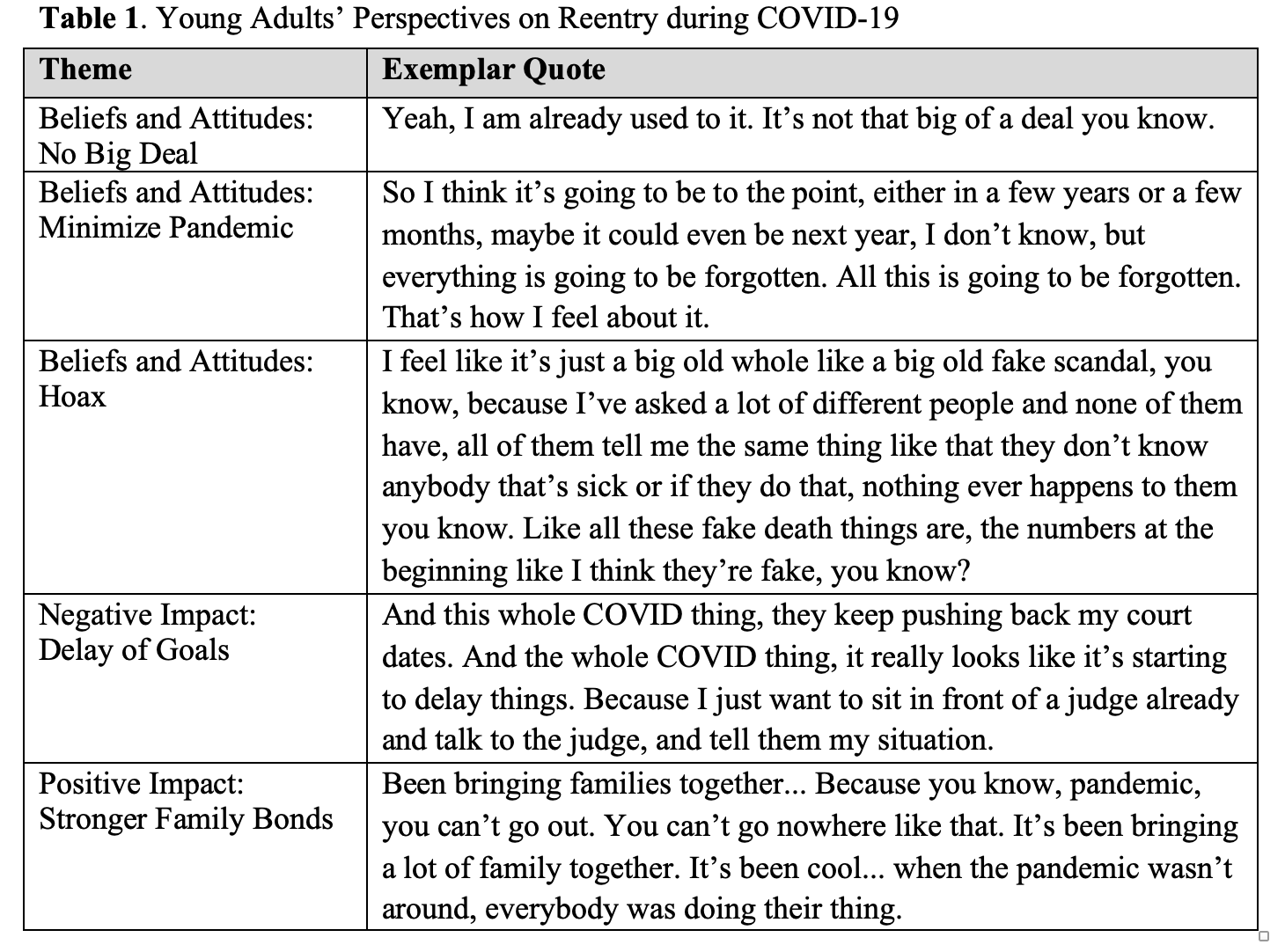Adolescent Medicine: General
Category: Abstract Submission
Adolescent Medicine I
484 - “I don’t even care what’s going on outside”: A qualitative study of young adults undergoing community reentry after incarceration during COVID-19
Friday, April 22, 2022
6:15 PM - 8:45 PM US MT
Poster Number: 484
Publication Number: 484.100
Publication Number: 484.100
Elizabeth Barnert, University of California, Los Angeles David Geffen School of Medicine, Los Angeles, CA, United States; Desiree R. Acosta, University of California, Los Angeles David Geffen School of Medicine, Bellflower, CA, United States; Taylor A. Reed, University of California, Los Angeles David Geffen School of Medicine, Los Angeles, CA, United States; Christopher Bondoc, University of California, Los Angeles David Geffen School of Medicine, Los Angeles, CA, United States; Mary Murillo, UCLA Mattel Childrens Hospital, Los Angeles, CA, United States; Laura S. Abrams, University of California, Los Angeles, Culver City, CA, United States

Elizabeth Barnert, MD, MPH, MS
Associate Professor
University of California, Los Angeles David Geffen School of Medicine
Los Angeles, California, United States
Presenting Author(s)
Background: Young adults undergoing reentry after incarceration face difficult social tasks and significant health challenges. In early 2020, justice-involved individuals experienced additional and disproportionate stressors and barriers due to the rapid social, environmental, and public health changes tied to the COVID-19 pandemic.
Objective: We sought to understand the experiences of young adults reentering the community after incarceration during the COVID-19 pandemic.
Design/Methods: A sample of 15 justice-involved young adults, aged 18-25, completed a longitudinal series of up to 9 monthly semi-structured interviews from June 2020-April 2021. Interviews examined young adults’ health, access to jobs and housing, and attitudes towards COVID-19. On average, participants completed 4 interviews (65 total interviews). All 15 participants identified as Black or Latinx, with 13 of the 15 participants also identifying as male. We performed inductive thematic analysis to identify themes about the young adults’ reentry experiences during COVID-19.
Results: Attitudes towards COVID-19 included 1) believing the pandemic was a hoax, 2) minimizing the seriousness of COVID-19, and less commonly, 3) viewing the pandemic as a serious concern (Table 1). Due to pandemic-related closures, some participants shared difficulty meeting probation requirements, obtaining employment, and pursuing education. However, other participants felt that the pandemic helped them avoid behaviors that could result in recidivism, such as re-engaging in substance use. Additionally, some participants reported that pandemic-related restrictions facilitated stronger familial relationships. All participants reported some behavior change aligned with pandemic-related regulations (e.g., social distancing), despite financial and social barriers to compliance.Conclusion(s): In summary, COVID-19 had both positive and negative impacts on young adults’ reentry after incarceration. Justice-involved young adults were tasked with meeting their basic needs while simultaneously navigating the arduous process of reentry, leading them to overall disregard the COVID-19 pandemic. Participant’s relative lack of focus on the COVID-19 public health crisis underscores the difficulty of the reentry period and the challenges of justice involvement. Findings indicate an urgent need to expand and buttress support for justice-involved individuals during and beyond the ongoing pandemic.
Table 1 Table 1. Young Adults’ Perspectives on Reentry during COVID-19
Table 1. Young Adults’ Perspectives on Reentry during COVID-19
Objective: We sought to understand the experiences of young adults reentering the community after incarceration during the COVID-19 pandemic.
Design/Methods: A sample of 15 justice-involved young adults, aged 18-25, completed a longitudinal series of up to 9 monthly semi-structured interviews from June 2020-April 2021. Interviews examined young adults’ health, access to jobs and housing, and attitudes towards COVID-19. On average, participants completed 4 interviews (65 total interviews). All 15 participants identified as Black or Latinx, with 13 of the 15 participants also identifying as male. We performed inductive thematic analysis to identify themes about the young adults’ reentry experiences during COVID-19.
Results: Attitudes towards COVID-19 included 1) believing the pandemic was a hoax, 2) minimizing the seriousness of COVID-19, and less commonly, 3) viewing the pandemic as a serious concern (Table 1). Due to pandemic-related closures, some participants shared difficulty meeting probation requirements, obtaining employment, and pursuing education. However, other participants felt that the pandemic helped them avoid behaviors that could result in recidivism, such as re-engaging in substance use. Additionally, some participants reported that pandemic-related restrictions facilitated stronger familial relationships. All participants reported some behavior change aligned with pandemic-related regulations (e.g., social distancing), despite financial and social barriers to compliance.Conclusion(s): In summary, COVID-19 had both positive and negative impacts on young adults’ reentry after incarceration. Justice-involved young adults were tasked with meeting their basic needs while simultaneously navigating the arduous process of reentry, leading them to overall disregard the COVID-19 pandemic. Participant’s relative lack of focus on the COVID-19 public health crisis underscores the difficulty of the reentry period and the challenges of justice involvement. Findings indicate an urgent need to expand and buttress support for justice-involved individuals during and beyond the ongoing pandemic.
Table 1
 Table 1. Young Adults’ Perspectives on Reentry during COVID-19
Table 1. Young Adults’ Perspectives on Reentry during COVID-19